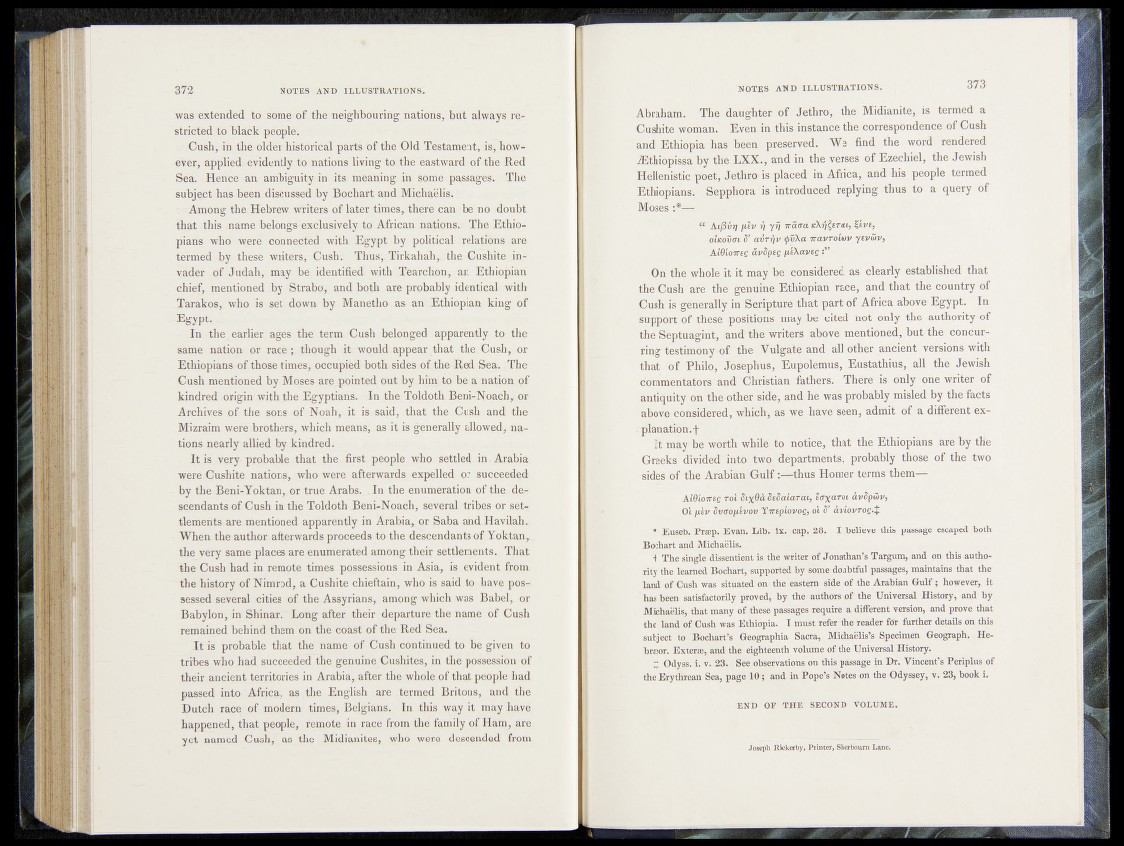
was extended to some of the neighbouring nations, but always re-*
stricted to black people.
Gush, in the older historical parts Of the Old Testament, is, however,
applied evidently to nations living to the eastward of the Red
Sea. Hence an ambiguity in its meaning in some passages. The
subject has been diseussed by Bochart and Miehaelis.
Among the: Hebrew writers of later times,, there can be no doubt
that this .name belongs exclusively to African nations. The Ethiopians
who were connected with Egypt by political. relations are
termed by these writers, Cush. Thus,. Tirkahah,.;the Cushite invader
of Judah, may be identified, with Tearchon, an Ethiopian
chief, mentioned by Strabo, and both are probably identical with
Tarakos, who is set down by Manetho as an Ethiopian king of
^Egypt.
In the. earlier ages the term Gush belonged apparently to the
same nation or race ; though it would appear sthat the_Cush, or
Ethiopians of those times, occupied-both sides of the Red Seai. .The
Cush mentioned by Moses are_pointed out by him to be a nation qf
kindred origin with the Egyptians. In the Toldoth Beni-'Noach^ or
Archives of the sons of Noah, it is. said, that the ..Gush and the
Mizraim were brothers, which means, as it is'generally allowed, nations
nearly alUed by kindred.
It is very, probable that the first people who settled in. Arabia
were Cushite nations, who were afterwards expelled or succeeded
by the Beni-Yoktan, or true Arabs.,. In the enumeration of the..descendants
of Cush in the Toldoth JBeni-Noach, several tribes or settlements,
are mentioned apparently in Arabia, or Saba and.Havilah..
When the author afterwards proceeds to the descendants of Yoktanr.
the very same places are enumerated among.their settlements. That
the Cush had in remote times, possessions in Asia,, is. evident from
the history of Nimrod, a Cushite chieftain, who is said,to have possessed
several cities of the Assyrians, among which was Babel, or
Babylon, in Shinar. Long after their departure the name of Cush
remained behind them on the coast of the Red Sea.
It is probable that the name of Cush continued to be given to
tribes who had succeeded the genuine Cushites, in the possession of
their ancient territories in Arabia, after, the whole of that people had
passed into Africa, as the English are termed Britons, and the
Dutch race of modern times, Belgians. In this way it may have
happened, that people, remote in ,race from the family of Ham, are
yet named Cush, as the Midianites, who were descended from
Abraham. The daughter of Jethro, the Midianite, is termed a
Cushite woman. Even in this instance the correspondence of Cush
and Ethiopia has been preserved. We find the word rendered
iEthiopissa by the LXX., and in the verses of Ezechiel, the Jewish
Hellenistic poet, Jethro is placed in Africa, and his people termed
Ethiopians., Sepphora :is introduced replying thus to a query of
Moses :*—
e( Aij3ujj fih> if yrt iraaa tckri^eTai, Zevt,
, dicovm S’ avryv <pv\a> iravToipv ysviov,
\ \ Ai6io7rsQ avSpsQ usAavtg :w -
On the whole it it may be considered as clearly established that
the Cush are the'genuine Ethiopian race, and that the country of
Cush is generally in Scripture that part of Africa above Egypt. In
support of these positions may be cited not only the authority of
the Septuagint, and the writers above mentioned, but the concurring
testimony-of the Vulgate and all other anbient versions with
that -'of Philo, Josephus, Eupolemus, Eustathius, all the Jewish
commentators and Christian fathers. There is only one writer of
antiquity on the other side, and he was probably misled by the facts
above considered, which, as we have seen, admit of a different explanation,
f
It may be worth while to notice, that the Ethiopians are by tlie
Greeks divided into two departments, probably those of the two
sides of the Arabian Gulf:—thus Homer terms them—.
AiBioms rot StyBd SsSaiarcu, ?er%ar§i dvSpiav,
Oi /jlsv SvGo/ibvov YTTspiovog, m S’ dviovroQ.%
*■ Euseb. Praep. Evan. Lib. ix. cap. 28. I believe this passage escaped both
Bochart and Miehaelis.
+ The single dissentient is'the writer of Jonathan’s Targum, and on this authority
the learned Bochart, supported by some doubtful passages, maintains that the
Una of Gush was Situated on the eastern sidehbf the Arabian Gulf ; however; it
has been satisfactorily proved, by the authors of the Universal History, and by
IWinhnnliB, that many of these passages require a different version, and prove that
the land of Cush was Ethiopia. I must refer the reader fdr further details on this
subject to Bochart’s Geographia Sacra, Michaelis’s Specimen Geograph. He-
brseor. Exterse, and the eighteenth volume of the-Universal History.
$ Odyss. i. v/23. See observations on this passage in Dr. Vincent’s Periplus of
the Erythrean Sea, page 10; and in Pope’s Notes on the Odyssey, v. 23, book i,
-END OF THE SECOND VOLUME.
Joseph Rickerby, Printer, Sherboum Lane.